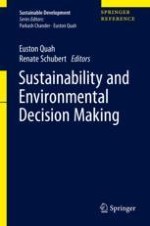
2021 | OriginalPaper | Chapter
1. Energy Efficiency Gap in Switzerland: An Empirical Study on Online Purchases of White Goods
Author : Marcel Stadelmann
Published in: Sustainability and Environmental Decision Making
Publisher: Springer Singapore
Activate our intelligent search to find suitable subject content or patents.
Select sections of text to find matching patents with Artificial Intelligence. powered by
Select sections of text to find additional relevant content using AI-assisted search. powered by